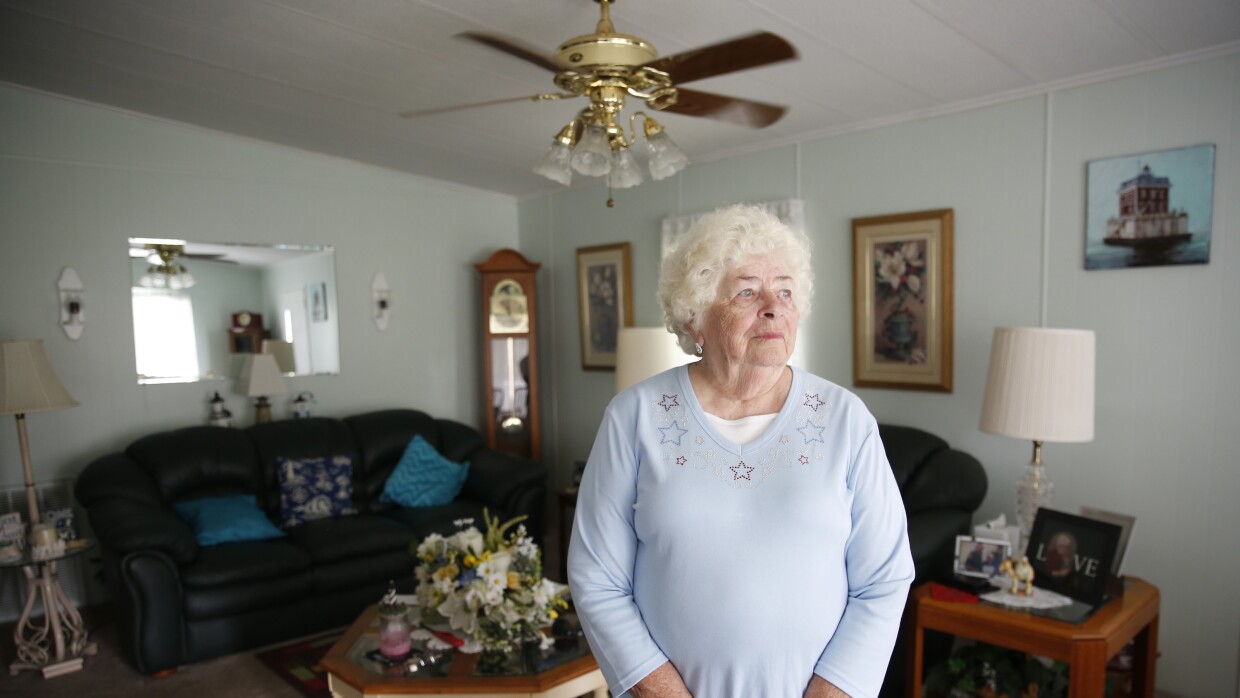Homeowners in Florida are being quietly priced out of their communities. People often own their manufactured homes but rent the lot underneath them.
Census data shows lot rent in the state has nearly doubled over the last decade.
That means manufactured housing parks, which are considered the largest source of unsubsidized affordable housing, are now growing unaffordable.
Under Florida law, management can pass along fees, like utility charges and property tax increases, as long as they are considered “reasonable” and are mentioned in a park’s original governing document, which is called a prospectus.
One example is retiree Judy Schofield, who moved from Connecticut to the Royal Palm Village community in Haines City. She had to take on a part-time job to help keep up with her bills due to rising lot rent.
In her words: Judy Schofield
Parts of this interview were edited for clarity.
My name is Judy Schofield. I am 85 years old and I live in Royal Palm Village.
I retired after working over 60 years. I decided I’d come down here because my daughter lived in Clermont. And we found this home.
I love this home. I love my yard, and I enjoy living here.
What’s bothering me now is the fact that I’m probably going to have to leave because the rent on the lots keeps going up. And I didn’t realize that it was going to be that much of an increase each month.
But so far, the increases have been at least $40 a month. Right now I am paying – I started out at $675 and now I’m up to $786. So depending on that, I probably won’t be able to stay.
I’m looking at places that I can move to, which is very emotional because I really don’t want to leave my home.
I’ve also gone back to work. I work at Publix and I’m part-time. I’ve been there now 16 months as a cashier, and it’s tough, but it helps to pay the bills.
I enjoy working with the people I work with and the young people, but is that what you want to do at 85?
I would rather be volunteering someplace than working, but that’s not an option I have anymore. If my hours get cut because of a lack of business, or they’re bringing more people in, then I think, well, that means I don't have enough money to do fuss and so for my home or to eat or anything else.
So it’s a process of going to work – making sure that you have enough to pay your bills. Because right now, I'm paying $1,700 more a year than when I first moved in. And if it wasn’t for my daughter, I wouldn’t be here now. She's helping me pay the bills, which is why I'm able to stay, but I can't keep doing that.
I thought after living 79 years in Connecticut and coming down here, I thought the way they spoke to us when we were looking at the home was that this was going to be your forever home, and that they cared about us.
Next thing you know, the rent is going up and up, and you keep thinking: How much longer can I do this? And how much longer will my pension keep me?
And Social Security definitely does not keep pace with prices. So it’s been a very emotional time for me the past few months now.
I’ve been looking at apartments back home, and everything up north, of course, is expensive as well. And it means I would have to leave just about everything I have behind to move back.
It’s a tough time. I just don't know where it’s going to end.
And I went, the next increase comes, then I’ll know whether I can stay or not. Because every time there’s an increase, I know my daughter steps up, and I don’t like having her have to help me out. That bothers me tremendously.
And the thoughts that I used to go out with the women’s groups to go to lunch once in a while so I could get out for a little while, and I’ve had to curtail that. I only go out to lunch maybe a couple times a month now, and that’s with a couple other friends because you just can’t afford to do that.
Every dime you get has to be put into your home. All the taxes – everything that you get here.
So it’s almost like they tell you one thing, and they make you feel so comfortable that this is a community for seniors that they care about you. Come here, relax, enjoy.
So you come in here with expectations of being able to do something you’ve never been able to do, only to have those dreams and thoughts crushed because you can no longer live in the house you now love and you care about.
Judy Schofield turned 86 after this interview was conducted. This project was supported by The Pulitzer Center's Local Reporting Grant.




